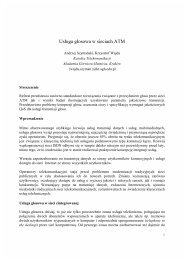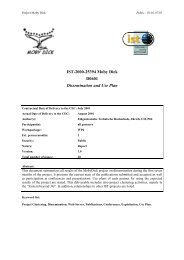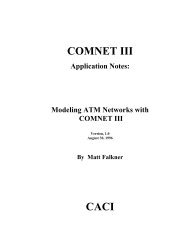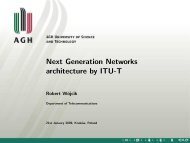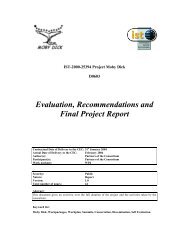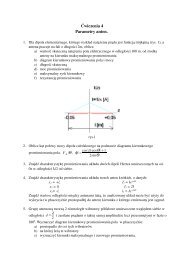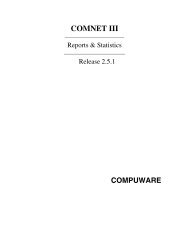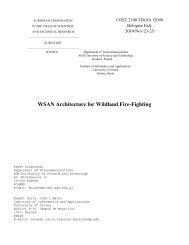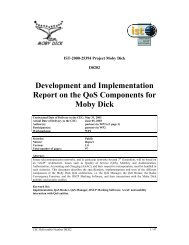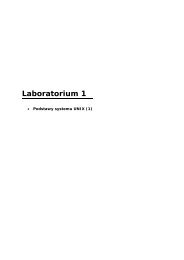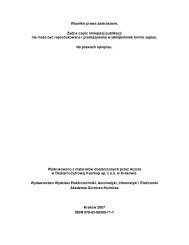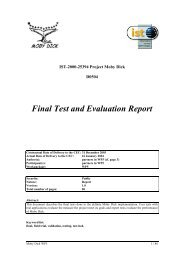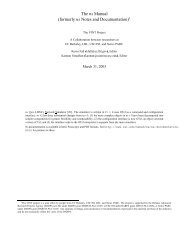Moby Dick Consolidated System Integration Plan
Moby Dick Consolidated System Integration Plan
Moby Dick Consolidated System Integration Plan
You also want an ePaper? Increase the reach of your titles
YUMPU automatically turns print PDFs into web optimized ePapers that Google loves.
D0103v1.doc Version 1 6.7.2003<br />
4.1.2.3.4 Paging<br />
There is no specific entity in the RCM module to handle paging. The paging entity in the RCF directly<br />
transmits the IP paging packets to the Control Packet sub-block, of the Packet Reception block, of the<br />
RCM. These IP paging packets will be passed to the IPv6 stack, and will automatically reach the Paging<br />
module.<br />
Enhanced IPv6 stack<br />
RCM<br />
Radio<br />
Connection Manager<br />
Radio<br />
Infos<br />
Open /<br />
Close<br />
Packet Transmission<br />
Control Data<br />
Packet Packet<br />
Packet Reception<br />
Control Data<br />
Packet Packet<br />
Conn<br />
RCF<br />
TD-cdma<br />
Infos<br />
TDCDMA<br />
Connection Manager<br />
Open /<br />
Close<br />
Conn<br />
Paging<br />
Control Channel Mngt<br />
Send /<br />
Receive<br />
Data<br />
Data Channel Mngt<br />
Open /<br />
Close<br />
Data<br />
Chanels<br />
Send /<br />
Receive<br />
Data<br />
AS<br />
4.1.2.3.5 Packet Transmission block<br />
Figure 13: Packet Transmission block<br />
The connection must have been opened by the Radio Connection Manager sub-block, before any IP<br />
packet can be transmitted (if it’s not the case, they will be dropped, but this should never happen as the<br />
TD-CDMA driver is “linked” to the IP stack only when the radio connection is established). An open<br />
connection means that the Access Stratum has established all the associated radio control channels, but<br />
that no radio bearer has been pre-established.<br />
In case of connection loss, we do not buffer the received IP packets, as it will take time to re-establish the<br />
connection (we will have to perform the whole registration process), and we do not even know if we will<br />
still be using the TD-CDMA, or if the MTNM will decide to use another technology (WLAN / Ethernet).<br />
The only case when we will probably want to buffer IP packets is during a fast handover between two<br />
Radio Gateways, during the phase between the closing of the old connection and the opening of the new<br />
connection; as the TD-CDMA driver is constantly “linked” to the IP stack and can receive packets at any<br />
time during this process.<br />
The Packet Transmission block receives IP packets from the enhanced IPv6 stack.<br />
It will determine if it is an IP signalling packet or an IP data packet, by analysing its DSCP code (the IP<br />
signalling packets will have a specific DSCP code).<br />
The IP signalling packets are transmitted directly to the Control Channel Management block of the RCF<br />
(with the local connection reference).<br />
The data packets are analysed to perform the mapping between IP QoS classes and radio bearers / radio<br />
QoS classes: based on the DSCP of the IP packet, a radio bearer is selected, with a radio QoS class<br />
associated to it. The RCM manages a fixed number of radio bearer, each one associated to one of the<br />
radio QoS class available. This mapping is performed on the Radio Gateway, not on the Mobile Terminal.<br />
If the radio bearer is not yet establis hed, a request is made to the Data Channel Management block of the<br />
D0103v1.doc 29 / 168



